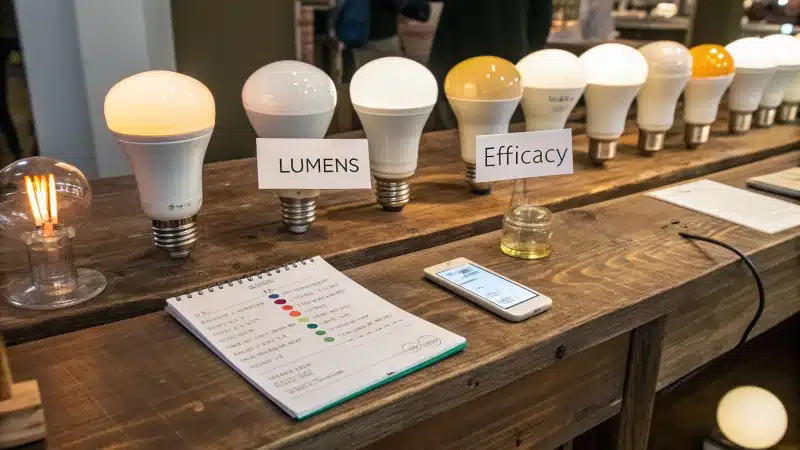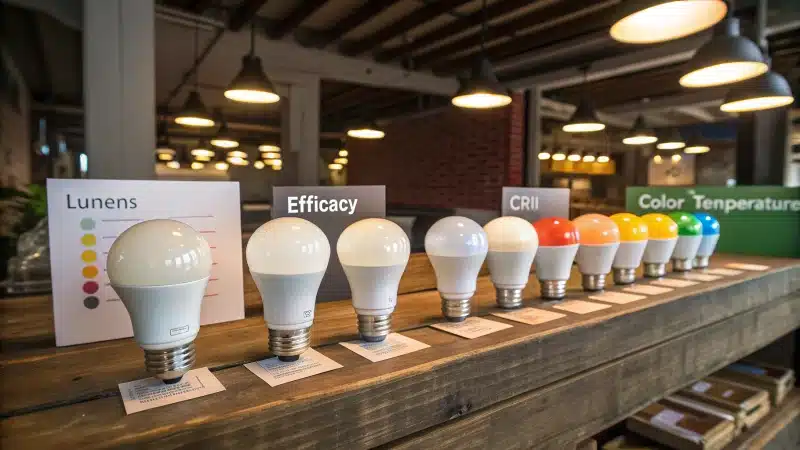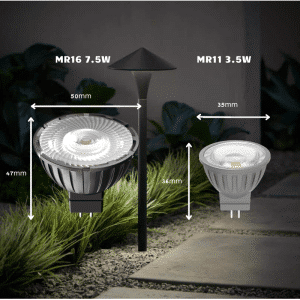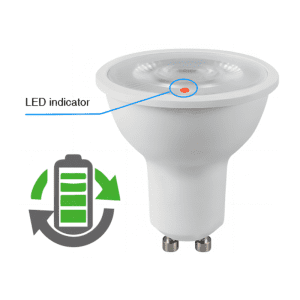
Choosing the right LED lighting for bulk purchases involves more than just looking at price tags.
To evaluate the price-quality ratio of LED lighting for bulk purchases, consider key quality factors like lumens, efficacy, CRI, color temperature, lifespan, and warranty. Additionally, analyze costs including sourcing, shipping, and total cost of ownership. Aim for a balance of quality and price for optimal long-term savings.
While this provides a quick overview, the real insights lie in understanding how these elements interact and affect your decision-making process. Read on to discover detailed strategies for assessing LED lighting quality and pricing, ensuring you make informed choices that benefit your business in the long run.
Higher lumens indicate better LED light quality.True
Lumens measure brightness; higher lumens mean brighter, better quality.
Longer warranties usually imply lower LED quality.False
Longer warranties often indicate confidence in product durability and quality.
What Key Quality Factors Should You Consider in LED Lighting?
Choosing the right LED lighting involves more than just picking a bulb. It’s essential to understand several quality factors to ensure you get the best performance and value for your needs.
When selecting LED lighting, consider lumens for brightness, efficacy for energy efficiency, CRI for color accuracy, color temperature, lifespan, warranty, and relevant certifications to ensure optimal performance.

Lumens and Brightness
Lumens measure the total amount of visible light from a lamp or light source. Unlike watts, which measure energy use, lumens tell you how bright the light will be. More lumens mean a brighter light. It’s vital to compare lumen outputs to achieve optimal brightness1 for your space.
Efficacy: Energy Efficiency
Efficacy is defined as the ratio of lumens emitted to the power consumed (measured in watts). This factor is crucial if you’re looking to save on energy costs. LEDs with higher efficacy ratings are more energy-efficient. Check out various energy-efficient options2 available on the market.
Color Rendering Index (CRI)
CRI measures how accurately a light source displays colors in comparison to natural light. A higher CRI indicates better color accuracy. For applications requiring precise color recognition, choose LEDs with a CRI of 80 or higher. Learn how CRI impacts your lighting3 environment.
Understanding Color Temperature
Color temperature is measured in Kelvin (K) and indicates the hue of the light source. Lower values (2700K) offer warm, yellowish light, while higher values (5000K) provide cool, bluish light. Decide on a color temperature that suits your desired ambiance4.
| Color Temperature | Ambiance Type |
|---|---|
| 2700K-3000K | Warm, Cozy |
| 3500K-4100K | Neutral, Inviting |
| 5000K-6500K | Cool, Alert |
Lifespan and Durability
LEDs are known for their longevity. However, advertised lifespans can vary significantly. Ensure the LED lights you consider have a substantial lifespan, often indicated in hours. This ensures less frequent replacements and long-term savings.
Warranty and Certifications
A reliable warranty reflects a manufacturer’s confidence in their product’s quality. Look for comprehensive warranties covering several years. Additionally, verify certifications like Energy Star, which assure compliance with high-efficiency standards.
By thoroughly evaluating these factors, you can make an informed decision that aligns with your lighting needs5 while balancing quality and cost.
Higher lumens mean a brighter LED light.True
Lumens measure the brightness of a light source; more lumens equal more brightness.
LEDs with lower efficacy are more energy-efficient.False
Efficacy is the ratio of lumens to watts; higher efficacy means more energy efficiency.
How Does Pricing Structure Affect Your Purchase Decision?
The structure of pricing can significantly influence how and what consumers decide to purchase. It’s more than just numbers—it’s about psychology, perceived value, and strategy. But how exactly does this work?
Pricing structure impacts purchase decisions by influencing perceived value, creating urgency, and segmenting customers. Techniques like discounts, tiered pricing, and psychological pricing can alter consumer behavior and drive sales.

Understanding Psychological Pricing
Psychological pricing plays a pivotal role in shaping consumer behavior. Techniques like ‘charm pricing,’ where prices end in ‘.99,’ make products appear cheaper than they are. This approach exploits the consumer’s perception6 of value.
The Role of Discounts and Promotions
Discounts create a sense of urgency and exclusivity. Limited-time offers can trigger FOMO (Fear Of Missing Out), compelling consumers to make quick decisions. For example, a 20% off sale can lead to higher conversions compared to a minor price drop.
Tiered Pricing Models
Tiered pricing provides options for different customer segments. Offering basic, premium, and deluxe packages caters to varied needs and budgets. This structure helps maximize sales by appealing to both price-sensitive and value-focused buyers.
| Tier | Features | Price |
|---|---|---|
| Basic | Essential features | $10 |
| Premium | Extra features | $20 |
| Deluxe | All features + bonuses | $30 |
Perceived Value Versus Actual Cost
Consumers often weigh perceived value against actual cost. A product priced higher may be seen as higher quality or more exclusive. Conversely, a lower price might suggest inferior quality unless backed by strong brand reputation or customer testimonials7.
Influence of Subscription Models
Subscription-based pricing locks in customers for the long term, offering convenience and perceived savings. This model often includes benefits like free shipping or exclusive access, enhancing customer loyalty. Companies like Netflix successfully utilize this structure to retain users.
Shipping Costs and Additional Fees
Hidden costs like shipping can deter purchases if not disclosed upfront. Transparent pricing builds trust and encourages completion of purchases. Research8 shows that free shipping offers can significantly increase sales.
Comparing Cost Per Use
Calculating cost per use helps consumers evaluate long-term value. For instance, a high-quality LED bulb may cost more upfront but save money over its lifespan due to energy efficiency. This approach encourages informed purchasing decisions by focusing on total cost of ownership.
Charm pricing makes products appear cheaper.True
Charm pricing exploits consumer perception by ending prices in '.99'.
Tiered pricing models reduce sales conversions.False
Tiered pricing caters to different budgets, maximizing sales.
Why is Cost Per Lumen-Hour Important in Evaluating LEDs?
In the world of LED lighting, understanding the cost per lumen-hour is crucial for making informed purchasing decisions. This metric helps balance efficiency with cost, ensuring value over time.
Cost per lumen-hour is vital for evaluating LED lights as it measures the cost-effectiveness by dividing the price by lumens and lifespan. It guides consumers in choosing energy-efficient and budget-friendly options.

Understanding Lumens and Lifespan
LEDs have revolutionized lighting by offering superior brightness and longevity. Lumens measure the total visible light emitted, while lifespan indicates how long the LED will last. Calculating the cost per lumen-hour9 allows consumers to compare these features effectively.
Table: Cost Per Lumen-Hour Formula
| Factor | Description |
|---|---|
| Price | Initial purchase cost of the LED |
| Lumens | Total visible light output |
| Lifespan | Duration before LED dims significantly |
Importance of Cost Efficiency
Consumers often face the dilemma of upfront costs versus long-term savings. LEDs with a lower cost per lumen-hour might have a higher initial price but offer better long-term savings by consuming less energy and lasting longer. This metric also accounts for energy efficiency10, influencing both environmental impact and operating costs.
Practical Evaluation Tips
Evaluating LEDs goes beyond just calculating cost per lumen-hour. It’s essential to consider supplier reputation and request samples to test brightness and longevity firsthand. Get multiple quotes to ensure a competitive price and analyze the total cost of ownership (TCO), which encompasses installation, maintenance, and potential rebates available for energy-efficient lighting options.
Table: Total Cost of Ownership Factors
| Aspect | Consideration |
|---|---|
| Installation | Labor and equipment needed |
| Maintenance | Regular upkeep and part replacements |
| Rebates | Government or utility incentives |
Explore further by examining supplier credibility11 and checking if the LEDs meet industry certifications to ensure quality and reliability in your lighting choice.
LEDs have a shorter lifespan than traditional bulbs.False
LEDs are known for their longevity, often outlasting traditional bulbs.
Cost per lumen-hour helps in evaluating LED efficiency.True
This metric allows consumers to assess cost-effectiveness and energy efficiency.
What Practical Tips Can Help You Negotiate Better Prices?
Negotiating better prices is an art that can save you significant amounts of money. By employing a few strategic tips, you can enhance your bargaining skills and secure more favorable deals.
To negotiate better prices, focus on understanding the product’s value, build rapport with sellers, and prepare thoroughly by researching market rates. Employ effective communication and stay open to compromises.

Research and Prepare
Before entering any negotiation, arm yourself with comprehensive knowledge12 about the product or service. Understand market trends, average pricing, and key competitors. This information empowers you to leverage facts during discussions.
Build Strong Relationships
Establishing a rapport with the seller can significantly impact negotiations. A friendly, respectful relationship encourages transparency and may lead to more flexible13 pricing options. Express genuine interest in the seller’s offerings to build trust.
Focus on Value, Not Just Price
While price is crucial, understanding the full value proposition is essential. Analyze factors like quality, durability, and additional benefits. Demonstrate this awareness to negotiate a deal that balances price with long-term benefits.
| Value Factor | Considerations |
|---|---|
| Quality | Materials, craftsmanship |
| Longevity | Durability and warranty |
| Additional Benefits | Free services or perks |
Leverage Alternatives
Be prepared to discuss alternative options. Knowing similar products from other suppliers allows you to use them as a negotiation tool14. Mention these alternatives subtly to encourage better offers.
Master Effective Communication
Use clear, concise language and active listening techniques. Reflect on the seller’s needs and propose solutions that satisfy both parties. This skill fosters mutual understanding and creates a collaborative atmosphere15.
Be Ready to Walk Away
Sometimes, the best strategy is to be willing to leave if terms aren’t favorable. This demonstrates confidence and may prompt sellers to reconsider their offers. Remember, other opportunities often exist.
Incorporating these practical strategies into your negotiation process can enhance your ability to secure better prices while maintaining strong professional relationships.
Researching market trends boosts negotiation power.True
Knowing market trends helps you negotiate with informed insights.
Ignoring seller rapport leads to better deals.False
Building rapport often results in more flexible pricing options.
Conclusion
Evaluate LED lighting for bulk purchases by analyzing lumens, efficacy, CRI, color temperature, lifespan, warranty, and total cost of ownership to ensure optimal quality and price balance.
-
Understand how lumens affect lighting brightness and make an informed decision for your space. ↩
-
Discover top-rated energy-efficient LED lighting options to save on electricity bills. ↩
-
Learn about the importance of CRI in achieving accurate color representation in your space. ↩
-
Find guidance on selecting LED lighting based on your desired ambiance through color temperature. ↩
-
Evaluate your specific lighting requirements to choose the best LED options. ↩
-
Explore how charm pricing tricks can affect your perception of product value and price. ↩
-
Discover the impact of customer testimonials on enhancing perceived product value. ↩
-
Learn how free shipping can be a game-changer for boosting your online sales. ↩
-
Understand how cost per lumen-hour aids in comparing LED efficiency and value. ↩
-
Learn how energy efficiency translates into long-term savings with LEDs. ↩
-
Discover why a supplier’s reputation matters in LED quality assurance. ↩
-
Researching product market trends provides insights that strengthen your negotiating position by understanding competitive pricing. ↩
-
Building rapport encourages flexibility in negotiations by fostering trust and open communication. ↩
-
Utilizing alternatives as leverage can compel sellers to offer more competitive prices. ↩
-
Effective communication creates a cooperative atmosphere that can lead to more successful negotiations. ↩







